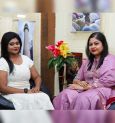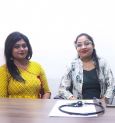What are the signs that indicate a need for glasses? If you use contact lenses, what aspects should you pay attention to? How can you prevent myopia? How frequently should you have your eyes checked by a doctor?
Dr. Bhaskar Mukherjee, Consultant Eye Surgeon with qualifications in BSc, MBBS, D.O., FRCS (Glasg), FRCOphth, MBA, and Ph.D. in Ophthalmology & Hospital Management, shares details on how to improve eyesight and provides tips on other eye-related problems.
Dr. Bhaskar Mukherjee highlights the importance of wearing glasses for those experiencing eye-related symptoms. According to him, neglecting the use of glasses could lead to discomfort, redness, watering, and gradually worsening eyesight.
In medical terms, this condition is referred to as asthenopic symptoms, indicating that as one's power increases, the strain on the eyes intensifies. Dr. Mukherjee dispels the common misconception that reaching the age of forty guarantees improved eyesight, emphasizing that glasses should be worn based on individual needs.
He explains that individuals immersed in the digital world, especially children and young adults, are prone to developing myopia due to prolonged use of computers, phones, and laptops. Treatment for myopia often involves prescribing concave lenses for short-sightedness and convex lenses for those experiencing farsightedness.
Dr. Mukherjee recommends exposing the eyes to sunlight for an hour daily as a therapeutic measure for myopia. Additionally, he advises regular eye check-ups, especially for children who may not express eye problems verbally, manifesting issues through activities like incorrect TV viewing or struggling with schoolwork.
For those considering a shift from glasses to contact lenses, Dr. Mukherjee assures that it can be done safely with proper hygiene practices. However, he cautions against using contact lenses without a clean hand habit and warns that laziness in maintaining lens cleanliness can lead to eye infections.
He suggests that once a person reaches 19 years of age and has become accustomed to wearing glasses, the transition to contact lenses can be considered. Dr. Mukherjee emphasizes that practicing good eye care habits and addressing vision issues promptly can significantly contribute to maintaining healthy eyesight throughout life.
 বাংলায় পড়ুন
বাংলায় পড়ুন













